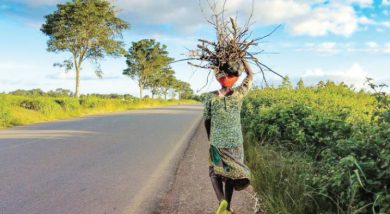Addressing climate change, poverty as one in Malawi
Malawi has been struggling to end poverty since independence in 1964, banking its strategies on the proceeds from its agro based economy. Sadly, climate change entered the scene and dramatically disrupted the farming sector.
Annie Ganizani, 47, a subsistence farmer from Kandulu village in Salima District has witnessed its impacts in the last decade.

“I was born in a family of subsistence farmers. My parents failed to give me education due to other reasons poverty, but when I got married and was blessed with some kids, I believed that through hard work I would be able to educate my kids,” said Ganizani.
Unfortunately her dreams were shattered by the prevailing brutal effects of climate change.
In 2004, heavy floods from near-by Lifidzi River destroyed her village and farm land.
“After the floods, we moved to this new area only to be given a smaller piece of land. We continued harvesting just enough to last us a few months. In the end we are engaging in activities that contribute to climate change” said Ganizani.
Now 10 years after relocating to upper land Ganizani, her family is poorer than they were in 1999. “I do believe that climate change and poverty should be addressed together,” she said.
Although climate change has turned the livelihoods of many villagers upside down and even in spite of the government of Malawi and other organizations’ continued interventions, communities are indirectly contributing to climate change.
“Many people want to run away from poverty by cutting down trees for charcoal and cultivating in river banks which, in turn, makes them more vulnerable to floods and droughts” said Majawa Bwanali, chairperson of the Kandulu Village Disaster Risk Management Committee (VDRMC).
Environmental District Officer for Salima Davies Chogawana concurs with Bwanali and said that efforts to reduce the impacts of climate change are continually challenged by local efforts to end poverty.
Assistant District Disaster Risk Management Officer (ADDRMO) Blessings Kamtema said that it is unfortunate that not all victims of climate change related disasters have been rehabilitated despite interventions.
With funding from UNDP under AAP projects, Kamtema said the Council and the community from Kandulu were able to build a dyke on the Lifidzi River which has prevented the river from flooding and causing havoc in Kandulu Village in the last three years.
Kamtema also said that with support from GEF, people of Kandulu village have built an evacuation point in times of floods so people no longer seek shelter at a primary school in the area.
And if poverty is not checked and alternative economic activities are not identified, little progress will be achieved to minimise our contribution to climate change. n






Most of the changes that need to be implemented to combat climate change do not require money and have very little to do with ‘poverty’. Good soil and water management, reforestation, the saving of open-pollinated seeds, diversification of diets, the integration of seasonal and perennial crops, etc. can all be accomplished without financial inputs. We need to break this ‘mental poverty’ that has convinced us that we need workshops, allowances, handouts and donor money to solve our problems. As we move into this year’s ‘hungry season’ we need to recognize the fact that the rainy season is Malawi’s most agriculturally productive time of the year. Those farmers who have diversified into ‘polycultural’ design systems capitalize upon annual rainy seasons to move into abundance and surplus while those who only planted maize will be hungry until April (and even then they will only be primarily harvesting one source of carbohydrate from one food group). We have a 12-month tropical growing season in Malawi and access to hundreds of nutritious crops, why are we only utilizing one month and one crop to try to meet all our our needs for the entire year? When we surround ourselves with all that we need (Malawi’s 6 food groups, building supplies, firewood, natural medicines, oils, fibres, income generating opportunities, etc) then we find that the reduction of poverty is an inevitable outcome of regenerative and diversified agricultural systems.